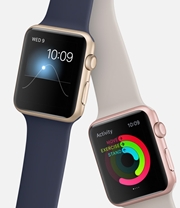Apple bets its way into wearables with launch of Apple Watch
10 Sep 2014
Apple finally made its big entry into the wearable technology market yesterday, unveiling its long-anticipated Apple Watch, which commentators say could prove to be yet another disruptive technology from the company.
 Apple CEO Tim Cook declared it as the next chapter in Apple's story at a packed event at the Flint Center for the Performing Arts in Cupertino, California. The Apple Watch would however, not be out until early next year, priced from $349, despite much anticipation of a release much earlier.
Apple CEO Tim Cook declared it as the next chapter in Apple's story at a packed event at the Flint Center for the Performing Arts in Cupertino, California. The Apple Watch would however, not be out until early next year, priced from $349, despite much anticipation of a release much earlier.
The iPhone maker also came out with additions to its iPhone family at the event, with Cook launching the 4.7 inch iPhone 6 and 5.5-inch iPhone 6 Plus, which he touted as the biggest advance in iPhone history.
These are thinner than earlier versions of the iPhone, and the devices come with Retina HD displays as also an enhanced A8 processor which was 50 per cent more efficient than the A7 processor found on the iPhone 5s and 5c.
The phones also marked the debut of Apple Pay, a contactless mobile payment technology. Companies working with Apple on Apple Pay include Mastercard, Visa and American Express as also retailers such as Target and Whole Foods.
According to tech analysts, Apple would launch the watch in time for the lucrative holiday season, especially at a time when rival Samsung was ramping up its efforts in the smartwatch space.
Meanwhile, Ash Kumar, chief executive and a co-founder of mobile advertising exchange TapSense, said in anarticle in Venture Beat, Apple Watch would continue the company's track record of disruptive innovation.
The key factors that would make the device disruptive, according to Kumar, are that with the internet on users' wrists, the implications would be huge for the internet of things for the device.
Moreover, the Apple Watch comes with big features for enabling health monitoring and frictionless payments with Apple Pay, both of which could be embrace mobile internet with significant impacts.
Plus, he said, Apple had a massive user base for ready uptake of new devices, to which it made a total of 800 million shipments of iOS devices according to its announcement during last WWDC.
Though there have been watches that checked one's pulse, played MP3s, and checked email, they were not functional extensions of the most powerful smartphone in history.
The iPhone 5s is faster, had more memory, and performance than PCs of a few years ago and is the hub of our digital lives.




















